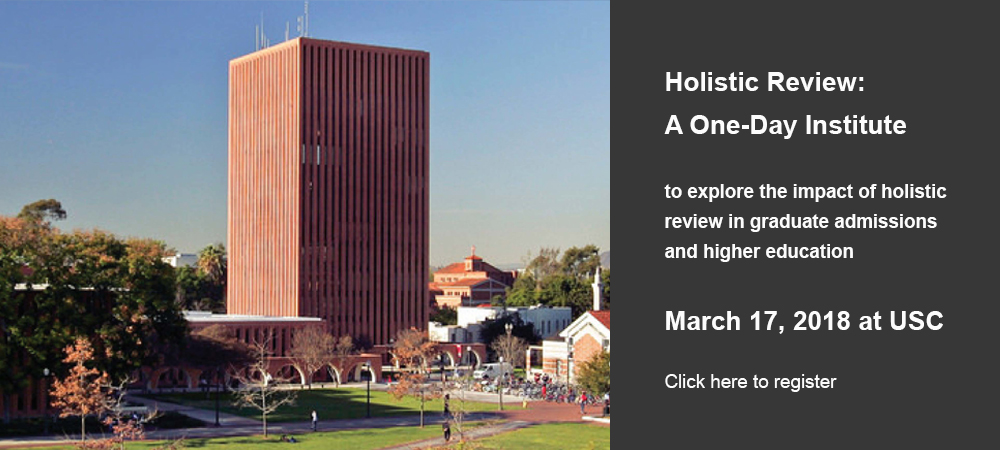
Holistic Review: A One-Day Institute — March 17, 2018
Holistic Review Institute — a day-long event to explore the impact of holistic review in graduate admissions and higher education — happens Saturday, March 17, 2018, on USC’s University Park Campus.
Holistic review is an evidence-based practice for identifying talent and increasing diversity in higher education. In this institute, which will be led by nationally recognized experts Drs. Julie Posselt (USC Pullias Center for Higher Education), Casey Miller (Rochester Institute of Technology), and Keivan Stassun (Vanderbilt University), you will:
- learn the research basis for holistic review;
- discuss practical applications to graduate admissions, hiring, REU selection, and other evaluative contexts;
- assess how holistic review can support broader institutional change efforts for diversity, equity, and inclusion.
- Faculty and staff interested in issues of diversity, equity, and inclusion, especially selection processes
- Department chairs, MS/PHD directors, REU site leaders.
- Graduate school administrators
- Affiliates of NSF-INCLUDES DDLPs
Registration is closed, but sign up to our newsletter to hear about future events.
Attendees, fill out this short survey to help us understand your interest in a future institute.
Hosts:
Be sure to follow the Pullias Center on Facebook and Twitter for updates and announcements as the event approaches.
Location:
University of Southern California (Room changed to SOS B49)
View/Download REVISED Parking and Directions PDF
USC Maps
Schedule
Friday
7 pm Optional dinner downtown
Saturday
8:15 am Registration
8:30 Introductions & goals
8:45 Common evaluation & selection practices in higher education
10:15 Coffee & snack break
10:30 The alternative: Holistic review
12:15 pm Lunch (Table discussions)
1:15 Case study: Identifying talent through the Fisk-Vanderbilt Masters-to-PhD Bridge Program
1:45 Designing for inclusive excellence: Holistic review & institutional change
2:45 Coffee & snack break
3:00 Implementing holistic review at your institution: Developing action plans
4:00 Debrief plans & discuss opportunities for follow-up
4:30 Adjourn
Speaker Bios
Julie Posselt is Assistant Professor of Education at the University of Southern California and a 2015 National Academy of Education/ Spencer Foundation postdoctoral fellow. Her research examines institutionalized inequalities in selective sectors of higher education, especially graduate education, elite colleges and universities, STEM fields, and the professoriate. Posselt is the author of Inside Graduate Admissions: Merit, Diversity, and Faculty Gatekeeping (Harvard University Press, 2016), an award-winning ethnographic comparative study of faculty decision making in doctoral admissions. Her research is also published in the American Educational Research Journal, Journal of Higher Education, Annual Review of Sociology, and Research in Higher Education, among others. A member of the editorial review boards for the Journal of Higher Education and Journal of Diversity in Higher Education, her research has been funded by the US Department of Education, Spencer Foundation, Mellon Foundation, and National Science Foundation. She received her PhD from the University of Michigan, and recently received the the 2017 Early Career Award from the Association for the Study of Higher Education.
Casey W. Miller is Associate Dean for Research and Faculty Affairs in the College of Science at the Rochester Institute of Technology. He is an experimental physicist focusing on nanoscale magnetic materials and related devices. He served as Director of the University of South Florida’s APS Bridge Site, which was created by the American Physical Society in 2013. He graduated summa cum laude from Wittenberg University in 1999 with University and Physics Departmental Honors, where he was also elected to FBK. He earned his PhD from the University of Texas at Austin in 2003, earning the Department’s Best Dissertation Award for work combining Magnetic Resonance Imaging with Scanning Probe Microscopy. His post-doctoral work at the University of California, San Diego, focused on quantum tunneling of electrons between magnetic films. He is recipient of the NSF-CAREER and AFOSR-Young Investigator Awards.
After earning A.B. degrees in physics and in astronomy from the University of California at Berkeley, and the Ph.D. in astronomy from the University of Wisconsin—Madison, Keivan Stassun was a NASA Hubble postdoctoral fellow before joining the Vanderbilt faculty in 2003. A recipient of a CAREER award from NSF and a Cottrell Scholar Award from the Research Corporation for Science Advancement, Stassun’s research on the birth of stars and planetary systems has appeared in more than 250 peer-reviewed journal articles. He is co-investigator for the NASA Transiting Exoplanet Survey Satellite (TESS) mission and chairs the executive committee of the Sloan Digital Sky Survey. From 2004 to 2015, he served as founding director of the Fisk-Vanderbilt Masters-to-PhD Bridge Program, through which Fisk has become the top producer of African American master’s degrees in physics and Vanderbilt has become the top producer of PhDs to underrepresented minorities in physics, astronomy, and materials science. He has served on the NSF Committee for Equal Opportunity in Science and Engineering, has been recognized by the Fletcher Foundation for “contributions advancing the spirit of Brown versus Board of Education,” is a recipient of the American Physical Society’s Nicholson Medal for Human Outreach, and is an elected Fellow of both the American Physical Society and the American Association for the Advancement of Science. In 2010, Stassun was invited to give expert testimony on “broadening participation in STEM” to the US House of Representatives Committee on Science and Technology. In 2017 Stassun launched a new interdisciplinary research initiative—the Vanderbilt Center for Autism & Innovation—focused on advancing workplace innovation through the employment of individuals with autism. Stassun was recently named the AAAS Mentor for 2018.